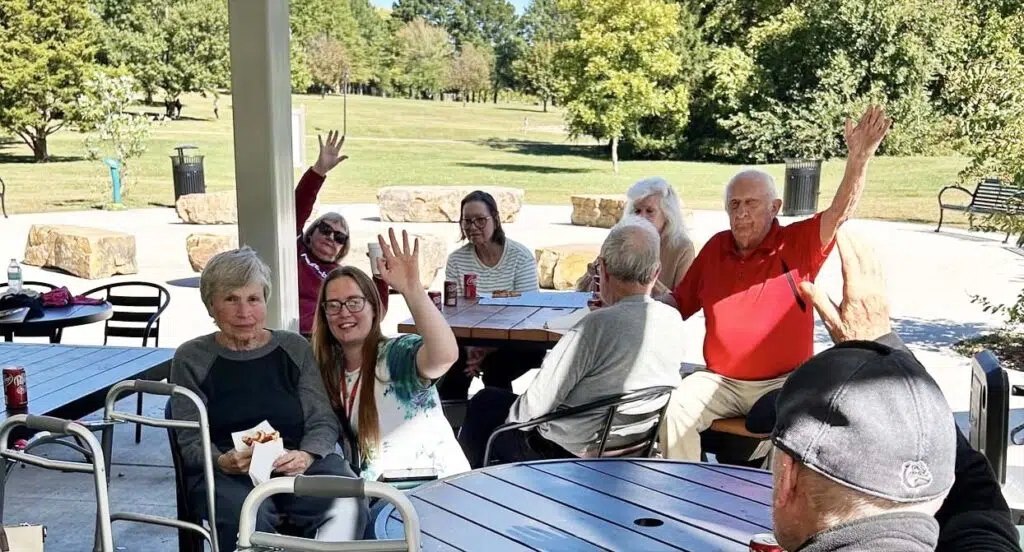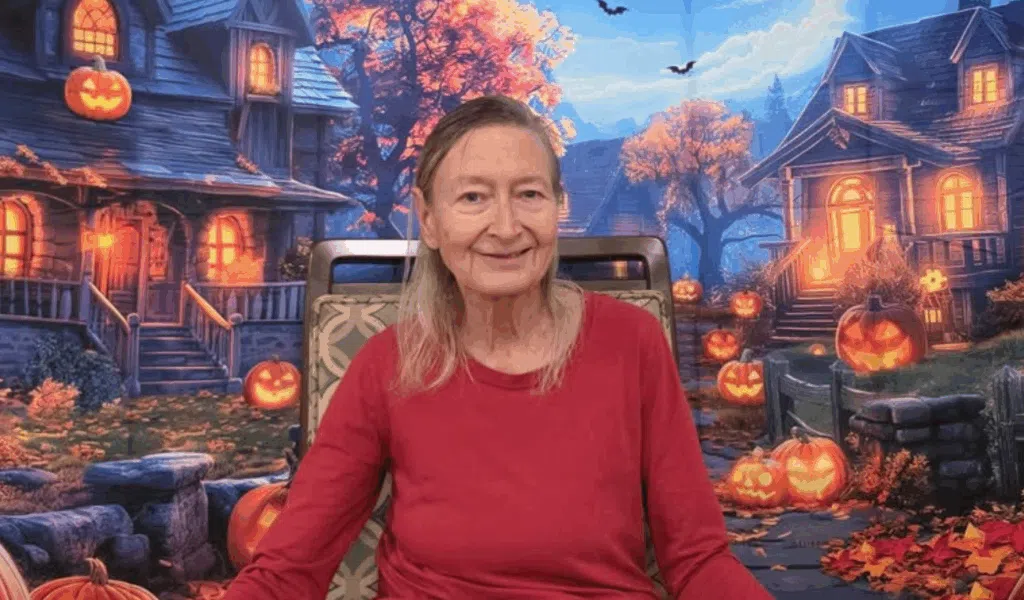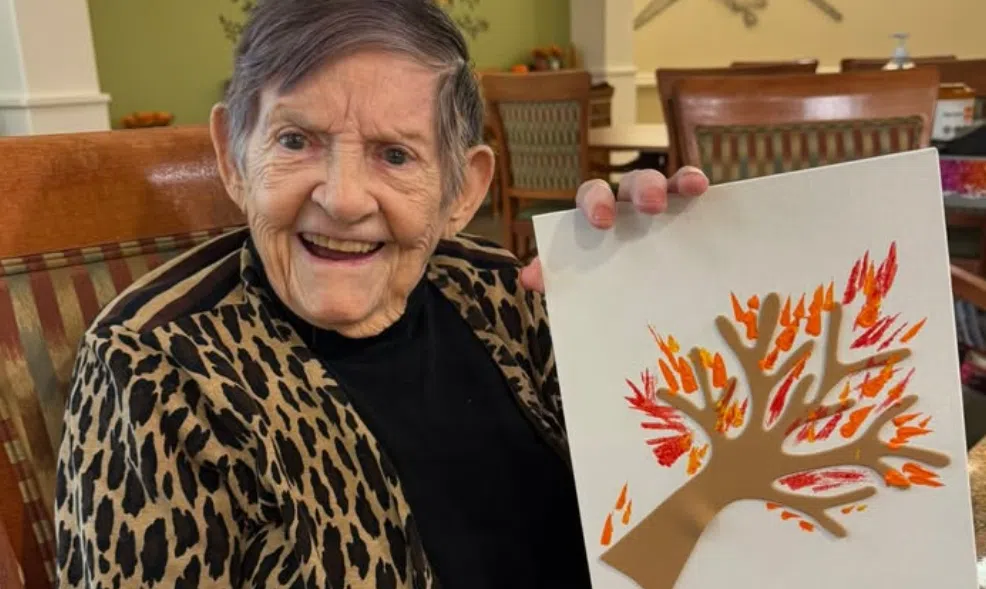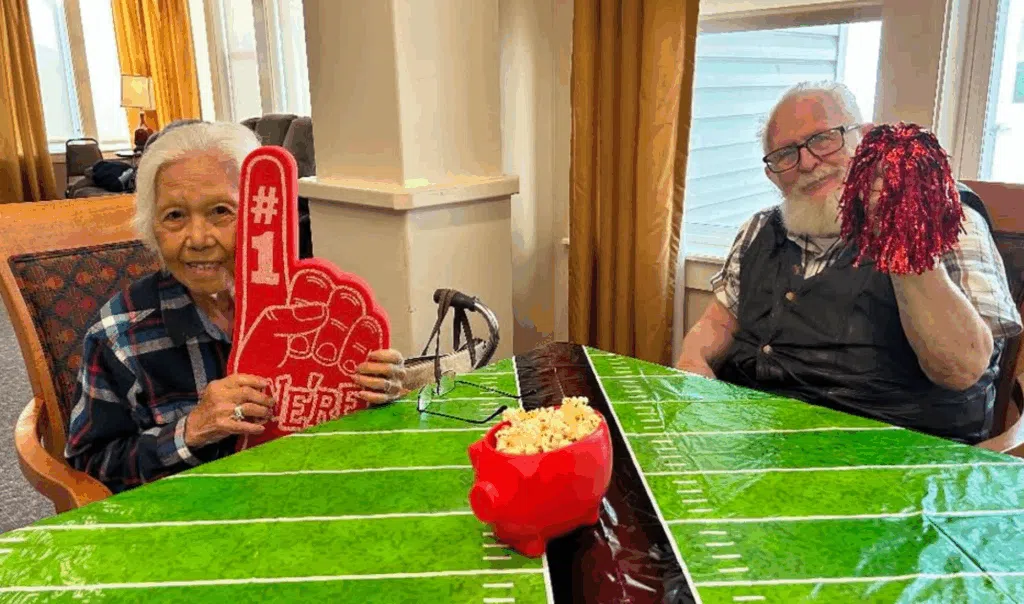The holidays always seem to come and go so quickly. One minute we’re sitting down to a Thanksgiving dinner and the next thing we know, we’re toasting the New Year. It often seems like more time is spent hustling back and forth and preparing for get-togethers than spending quality time connecting with loved ones.
For family caregivers of loved ones with dementia, there is an added layer of stress to the holidays. Will mom be able to tolerate a two-hour car ride to our family celebration? Will dad remember his favorite niece? How will we navigate around all the noise and excitement as the grandchildren open presents?
All these concerns can create anxiety for caregivers and their families. It’s supposed to be a time to relax and enjoy holiday traditions. But for too many family caregivers, the holidays have become something to “get through” rather than something to “look forward to”.
How can you change the holiday dynamics to produce less stress and bring more joy?
If you are caring for a loved one with dementia and are starting to feel stress over your holiday plans, it’s time to take a deep breath and know that you have more control over the holidays than you might think. Here are some tips to help minimize stress for you and your loved one and help foster more moments of joy for the entire family.
While the above steps may seem challenging, the preparation and adjustments you make will be rewarded with more relaxed and enjoyable holiday events and get-togethers. Your loved one will more likely be at their best, unrushed and relaxed. Your family will connect with them more easily and you will be more relaxed and able to enjoy the moment.
Even with planning, there may be moments when you begin to feel overwhelmed. That’s when it’s time to pause, take a deep breath, and remind yourself that it’s okay to set boundaries. Simplifying traditions, scaling back commitments, and focusing on what truly matters can transform the season into something more peaceful and meaningful. By choosing what works best for you and your loved one, you create space for less stress and more space for genuine joy.
We also invite you to call or drop in to any of our Anthem Memory Care communities for more tips and resources. We want your holiday experience to be positive, inclusive, and joyful … for the whole family.
Cassie Dennis, owner of the C Bar D Ranch in Cottonwood, California noticed a general lack of therapy ponies in the area and decided to do something about it.
Having worked in senior living before, Cassie contacted Willow Springs Memory Care in Redding and got the go-ahead to bring one of her favorite ponies, Taffy, by for a visit to the community.
The residents couldn’t get enough of the gentle pony, who strolled from one person to another. The impact of engaging with Taffy was felt almost immediately, sparking lively conversation and even a few memories from horse-loving residents.
Resident, Eileen Gallino, summed it up best, “It is so nice because [Taffy] seems to be more used to people than dogs are. She just walks along from person to person and gives people a piece of her personality, which is very, very nice.” Yes, indeed!
You can watch full coverage of Taffy’s visit on local Channel 7 KRCR news.
While the holidays are known for family gatherings and celebrations, one thing they are not generally associated with is healthy dining. Between the rich sauces and sweet desserts, the holidays can be challenging for anyone attempting to maintain a healthy diet. Maybe that’s why so many New Year’s resolutions contain the pledge to “lose weight”!
Individuals living with dementia must be particularly careful about what they put into their bodies because each spoonful has the potential to optimize or impair their cognition and physical wellbeing. Too much refined sugar, saturated fats, or salt can affect brain function, leading to potential physical and mental setbacks. Add to this the hustle and bustle of the holidays, and the result can be lethargy, confusion, and anxiety, making gatherings less joyful for everyone involved.
The key to healthier holidays is to optimize nutrition.
At our Anthem Memory Care communities, we have found that better nutrition can improve:
With improvements in these areas, residents are more active, feel better and optimize their cognitive function. All this leads to an overall improvement in their quality of life.
Likewise, there are ways for family caregivers to navigate the holiday meal challenges with foods that are delicious and also lean into the health needs of a loved one with dementia.
Below is a summarized list of healthy foods recommended by the Mayo Clinic to optimize brain and overall body health:
Fruits
Vegetables
Whole Grains & Legumes
Seafood
Healthier Fats
Herbs & Seeds
Of course, if you are not in charge of meal preparation, it won’t always be possible to tightly control what kinds of foods your loved one is exposed to at holiday gatherings. Starchy vegetables, cream sauces, cakes and cookies are part of so many holiday meals. The key is moderation. Keep watch over your loved one’s choices and limit the intake of saturated fats and sugar as much as possible.
To help with your holiday meal preparation, here are some additional resources and recipes that can help optimize brain health:
https://theofficialminddiet.com/recipe-bank
https://www.eatingwell.com/mind-diet-recipes-for-beginners-8666682
https://www.alztennessee.org/info/resources/mind-diet-and-brain-healthy-recipes
https://www.dementiasociety.org/post/the-mind-diet-a-brain-boosting-way-to-eat
Holiday meals can be both brain healthy and delicious, benefiting everyone in the family.
Including your loved one with dementia in family gatherings can bring many special moments of meaning and joy. Taking care to ensure that they are eating as healthy as possible will make those gatherings easier, happier, and more fulfilling. And, remember, healthier meal choices will benefit every member of the family!
At our Anthem Memory Care communities, our talented chefs are experts at creating nutritious, delicious dishes that promote better eating and better health. Our chefs would be happy to share some of their culinary secrets with you. Feel free to visit any of our communities and ask us for tips on healthy dining. We’re here to help!
Chelsea Place Memory Care residents and staff are giving back to families experiencing food insecurity in the greater Aurora, Colorado community through their recent month-long food drive.
Residents collected boxes of non-perishable goods, packaged them, and personally dropped them off at their local Partners of Food Bank of the Rockies center.
Charitable activities like these are clearly a win-win for everyone. Residents engage in efforts that benefit others while bringing a greater sense of purpose and meaning into their lives.
You can watch full coverage of the drive on local Fox news station KDVR.
When 85-year old Eldon Schreiner moved into Willowbrook Place Memory Care in Littleton, Colorado, he brought with him a unique challenge – and an opportunity. Eldon, who has been deaf since childhood, uses sign language to communicate. Wanting to include Eldon in all facets of daily life at Willowbrook, residents and staff have embarked on a series of classes to learn some of the basics of ASL (American Sign Language).
A friend of Eldon’s instructs the classes, along with Eldon’s assistance. While it is challenging and will take time, the communication barriers are beginning to break down, fostering an atmosphere of greater connection and camaraderie.
You can learn more about Eldon’s journey by watching the coverage on local KUSA Channel 9.
Have you ever had the privilege of knowing a nurse? If so, you’ve likely witnessed their remarkable dedication, selflessness, and unwavering commitment to helping others in every possible way.
Nurses occupy a unique and vital role in memory care. In addition to providing expert care, they serve as a bridge between residents, families, and the broader medical team, ensuring that care is coordinated, timely, and effective. Nurses are dedicated to delivering compassionate, holistic care that addresses the whole person, physically, emotionally, and mentally. And, remarkably, they do it in a way that preserves the residents’ dignity during a vulnerable time in their lives.
Here are three key areas where nurses are serving memory care residents and families every day:
1. Medical
Nurses play a central role in maintaining and monitoring the health of residents:
2. Daily Needs Supervision
Nurses work to create a predictable, supportive environment, optimizing the daily lives of residents with memory loss:
3. Emotional Support
Nurses provide and promote human connection and compassionate care:
Last year, during National Nurses Week, our COO, Lewis McCoy wrote, “Nurses are the heart and soul of memory care communities. They are there in moments of joy and moments of challenge, bringing not just expertise but empathy, kindness, and understanding to those who need it most. The work they do is not easy, and the challenges they face are real. They work long hours, with a deep commitment to improving the lives of others.”
His words beautifully articulate the impact of memory care nurses on everyone they meet and work with. At Anthem Memory Care communities, our nurses, as with all team members live our mission to “protect, engage, and love” our residents. Feel free to visit any of our communities and meet our nursing teams. You will be impressed with what you see. Our nurses will be happy to answer questions and share their insights with you.
If you are caring for a loved one with dementia, it may feel at times as though you are struggling to learn an entirely new language just to get a simple point across or keep them connected. That familiar rhythm of conversation that once came so easily is becoming less effective and, frankly, more frustrating.
The need to adjust communication styles is one of the realities of the cognitive decline associated with dementia that can be difficult for families to understand, let alone embrace. However, learning to do so will enable a more productive and loving conversation flow, which will help maintain healthier relationships while continuing to honor the loved one’s dignity.
Below are three key tips for more caring, productive communication:
In addition to using your words more effectively, here are few more things to remember about your conversations:
Developing new communication tactics isn’t easy. And don’t expect it to happen overnight. Be patient with your loved one and with yourself. Make it a point to share your insights and tactics with family and close friends so that they, too, can experience the benefits.
By building a new strategy to replace old communication patterns with new ones, you and your family can create more meaningful interactions, reduce frustration, and help your loved one engage and respond in the best way possible.
Remember, too, that you are not alone in your caregiver journey. Feel free to reach out to any of our Anthem Memory Care communities for more information or just to share your challenges with us. You are invited to attend one of our dementia support groups, led by licensed professionals, which bring family caregivers together to share their own challenges. And we will be happy to provide additional resources to help you navigate today’s challenges and those which lie ahead.
Residents of Emerald Place Memory Care in Glenview, Illinois, were honored to give back to those who have served our country by assembling “Kindness Bags” filled with daily essentials for homeless veterans in need of extra care and support. Each resident added a personal touch by creating a card with messages of gratitude and hope to include in every bag. Such a simple yet meaningful way to honor those who have given so much!
You can read more about the project in the local Glenview Patch.
Michael Grzywacz of Greenfield, a Marine Corps veteran, presented certificates of service to eight veteran residents of Franklin Place Memory Care in Franklin, Wisconsin. The ceremony also included commemorative pins and a celebratory cake, as fellow residents, families, and staff honored the veterans with a round of appreciative applause.
Among the honorees was 101-year-old Donal Jacobson, a WWII veteran who served on D-Day in Normandy.
More details about the veterans and this special event can be found in the Milwaukee Journal Sentinel.
The Thanksgiving season is all about giving back for residents and staff of Vineyard Place Memory Care in Murrieta, California. Recently they shared the spirit of giving by bringing warmth and care to the local Y.E.S Center.
The Y.E.S Center provides support to local youth and families in need. Vineyard Place residents and staff served breakfast and coffee, a simple act of kindness that filled hearts with gratitude on both sides.
The activity was covered in the local Murrieta Patch. You can read the full story here.
Providing loving care for an aging family member with memory loss can be emotionally and physically overwhelming, especially as their daily needs become more complex. It’s therefore common for family caregivers to feel isolated in their journey and unsure of the next steps. To navigate these challenges, caregivers need dependable information, practical guidance, and ongoing support. And that’s where trusted resources can make all the difference.
November is National Family Caregivers Month, a time to honor the loving, selfless individuals who provide essential care and support to a family member living with dementia. At Anthem Memory Care, we believe caregivers deserve recognition every day of the year. And they deserve all the support we can provide.
If you caring for a loved one with dementia, you need resources to support your challenging journey. Fortunately, there are several organizations with online websites dedicated to helping family caregivers manage daily responsibilities and prepare for what lies ahead.
Below is a list of ten helpful resources you may find valuable on your caregiving journey:
We’d also like to offer ourselves as a resource. We’re here to help!
Our resource page includes recorded webinars on a variety of topics led by Dr. Tam Cummings, gerontologist and dementia expert. There are also links to white papers and additional resources. Our Anthem communities also provide dementia support groups as well as respite care to give family caregivers time to re-charge and take care of their own needs.
Whether you need guidance, local connections, or simply someone to talk to, feel free to reach out to any of our Anthem Memory Care communities. We’re here to help you find the right support, both for today and as you plan for the future. We're just a call or visit away.
Residents of Concord Place Memory Care in Knoxville, Tennessee, collected more than 250 pairs of socks to help those in need during their annual “Seniors Reading Seuss for Socks” drive! Finding a creative way to spotlight the drive, the seniors took turns reading aloud beloved Dr. Seuss stories, while collecting socks from the greater Knoxville community, bringing joy, rhyme, and a touch of Dr. Seuss-style silliness to the season.
The generous donations will help provide warmth and comfort to those in need throughout Knoxville. The socks will be distributed by the Red Cross, sharing a little extra care and a lot of heart with those who need it most.
The drive was covered by local NBC News !0.
(Photo taken from NBC News 10 video)
Residents of Vineyard Place Memory Care in Murrieta were treated to a special Halloween surprise when fourth graders from Cole Elementary School stopped by for a visit. The students, dressed in bright and creative costumes, went trick-or-treating through the community, filling the halls with laughter, excitement, and lots of smiles.
“It was a wonderful opportunity for our residents to share in the joy and spirit of Halloween with the youngest generation,” said Luis Guillen, Director of Dining Services. The Murrieta Patch covered the event, and you can read the full article here.
Fall is one of our favorite times of the year, and for good reason. The cooler, crisp air and vibrant colors of changing leaves create a sensory-rich environment that our Anthem Memory Care community residents truly enjoy. Walks outdoors become more comfortable, and the familiar sights, sounds, and smells of autumn often spark memories and emotional connections.
The anticipation of upcoming holiday routines and traditions is both grounding and uplifting for residents. Our communities are already buzzing with preparation for seasonal activities, most of which also include family members. These activities never fail to strengthen bonds, creating many shared moments of joy.
Here are just a few of the fall activities we’re enjoying so far:

For Liberty Place Memory Care residents in West Chester, Ohio it’s time to pumpkin shop. But which one to pick?

Residents of Clear Creek Memory Care took advantage of a beautiful fall day in Fayetteville, Arkansas to visit their local park. Exercise, fresh air, and great company made for a memorable day.

Chisholm Place Memory Care in Wichita, Kansas held a photo session with an amazing backdrop. What a great way to capture a special moment!

Check out this winner of the Chelsea Place Memory Care pumpkin decorating contest in Aurora, Colorado. Yes, that popcorn “box” is actually a pumpkin!

A Concord Place Memory Care resident in Knoxville, Tennessee holds up a lovely piece of mosaic paper artwork to help decorate the walls for fall.

For these residents of Clear Creek Memory Care, it’s all about game day. Once a football fan, always a football fan!

Ears of popcorn were on sale at Willow Springs Memory Care in Redding, California, a creative and purposeful activity to raise funds to aid Alzheimer’s research.
If you are caring for a loved one with dementia, try re-connecting them to some of the fall activities that they have always loved. From pumpkin decorating to warm apple cider on the patio, fall is a time of beauty, reflection, and comfort. Our communities embrace every opportunity to make this season meaningful for residents and their families. You can do the same for yours.
We invite you to visit any of our Anthem Memory Care communities and take in all our fall decorations and activities firsthand. We’re here to answer your questions and share tips and resources. We’d love to learn more about your family and share our communities with you!
Liberty Place Memory Care in West Chester, Ohio recently enjoyed a surprise visit from some very special guests. Miniature cows from Boots N' Mini Moos were welcomed into the courtyard delighting residents with their unique and gentle presence and bringing lots of smiles and conversation.
But the visit brought the residents more than joy. For individuals living with cognitive impairment, interactions with animals can provide meaningful therapeutic benefits.
"It’s incredibly soothing for our residents," Amy Snow, Life Engagement Director at Liberty Place told WCPO, the local Cincinnati TV channel covering the event. "Many of them grew up with animals or lived on farms, so being around animals again—even briefly—can awaken comforting memories and a sense of connection. Just having them visit brings joy."
You can watch the full WCPO coverage here.
(photo courtesy of WCPO, De’ Jah Gross)